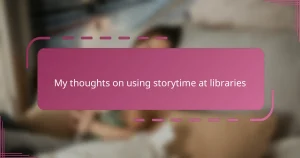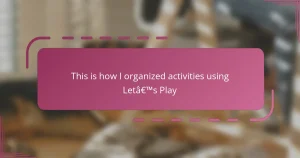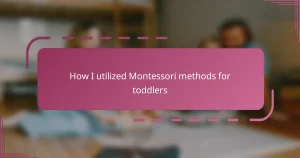Key takeaways
- Daniel Tiger’s Neighborhood effectively teaches children emotional skills, such as naming feelings and self-calming techniques through relatable stories and songs.
- Prioritizing emotional learning fosters trust and cooperation between parents and children, facilitating better communication and conflict resolution.
- Practical activities, like using a feelings chart and role-playing, help children practice empathy and emotional vocabulary in everyday situations.
- Engaging with your child during episodes can enhance understanding and create opportunities for deeper discussions about emotions and coping strategies.
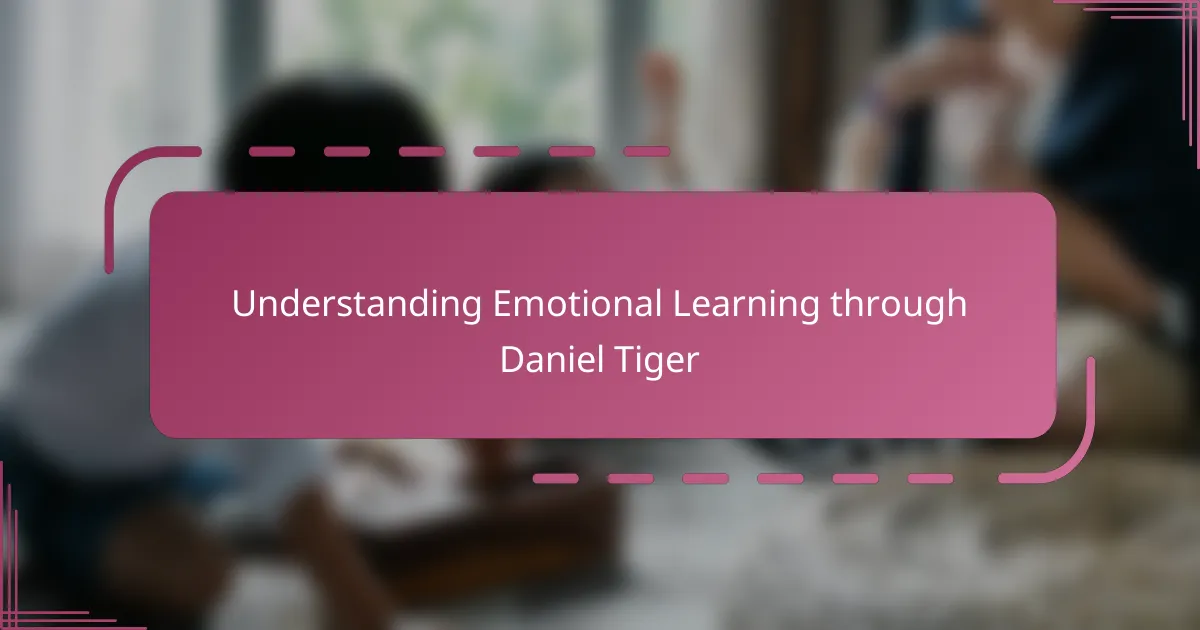
Understanding Emotional Learning through Daniel Tiger
Daniel Tiger’s Neighborhood offers a unique window into emotional learning by breaking down complex feelings into simple, relatable moments. I remember watching an episode with my child where Daniel felt frustrated about sharing toys—it was striking how naturally the show used gentle songs and clear language to model empathy and problem-solving. Have you noticed how these small lessons spark conversations about emotions at home? To me, that’s where the real power lies—in turning screen time into meaningful emotional growth.
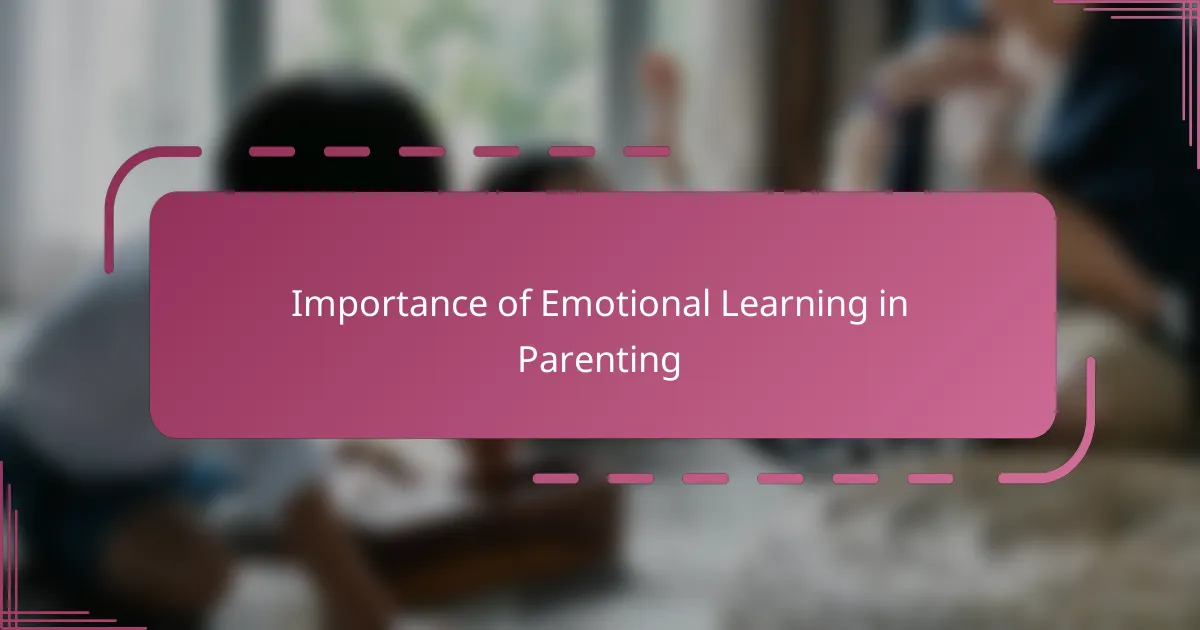
Importance of Emotional Learning in Parenting
Emotional learning is, without a doubt, at the heart of effective parenting. I’ve found that when parents prioritize helping kids recognize and name their feelings, it creates a foundation of trust and understanding that makes discipline and guidance feel more like teamwork than conflict. Have you ever noticed how much easier it is to connect with your child after simply acknowledging their emotions?
From my experience, teaching emotional skills early on helps children manage stress and navigate social challenges with more confidence. It’s like giving them a map to understand themselves and others, which reduces outbursts and builds empathy naturally. Don’t we all want our kids to grow up feeling secure enough to express what’s really going on inside?
Sometimes, I remind myself that emotional learning isn’t just for kids—it’s a journey we parents share alongside them. When I admit my own feelings and demonstrate healthy ways to cope, it shows my child that emotions are normal and manageable. Isn’t that what parenting is all about—modeling the very skills we hope they develop?
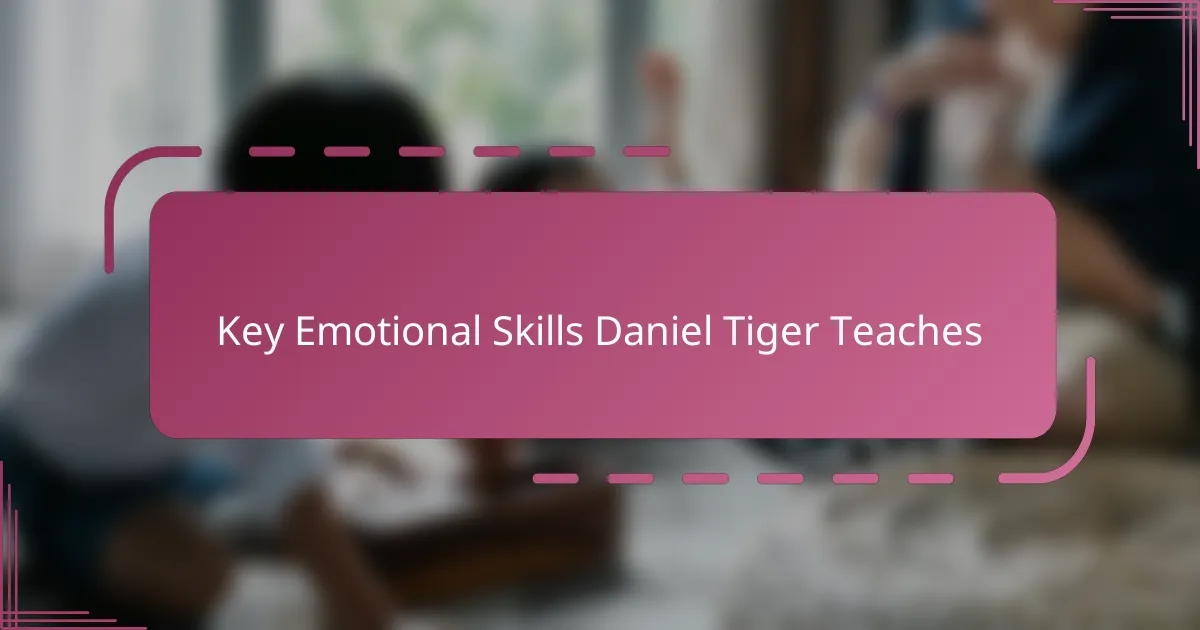
Key Emotional Skills Daniel Tiger Teaches
What stands out most to me about Daniel Tiger is how it teaches kids to name their feelings—whether it’s anger, sadness, or excitement. I remember my child repeating the phrase “I’m mad, and that’s okay,” and how that simple sentence opened up a whole new way for us to talk about emotions without judgment. Have you seen how powerful it is when a child can put their feelings into words so early?
Another key skill Daniel Tiger emphasizes is self-calming. The little songs about taking deep breaths or counting to four have become our household go-tos whenever frustration bubbles up. I’m convinced these gentle reminders help kids learn to pause and manage overwhelming emotions before they spill over. Isn’t that a skill we all wish we had mastered sooner?
Perhaps the most touching lesson is how Daniel models kindness and empathy toward others. Watching my child try to share and apologize just like Daniel shows me that these aren’t abstract ideas—they’re real behaviors kids can practice daily. Doesn’t it feel reassuring to see your child pick up not just emotional words, but emotional actions that build stronger friendships?
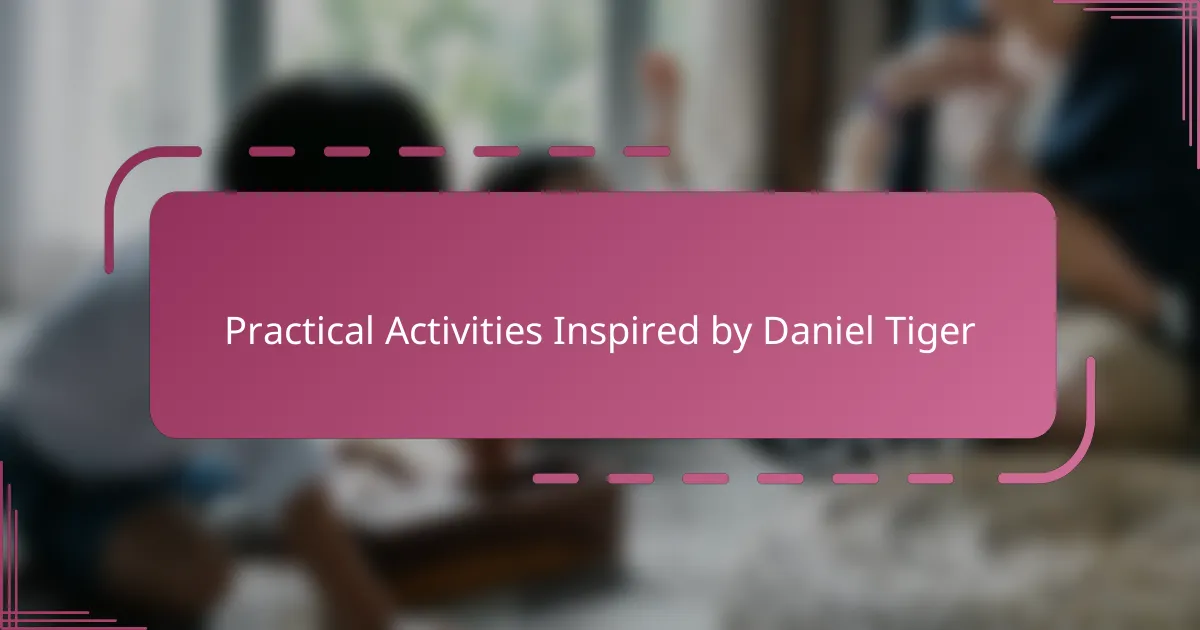
Practical Activities Inspired by Daniel Tiger
One practical activity we’ve loved is using Daniel Tiger’s “feelings” chart at home. After an episode, I ask my child to point to the face that matches how Daniel or they’re feeling, which sparks honest chats and helps them tune into their emotions. Have you tried this? It’s amazing how such a simple practice can deepen your child’s emotional vocabulary.
Another go-to for us is turning Daniel’s calming songs into a daily ritual. When my child feels overwhelmed, we pause together, take those deep breaths, and even count slowly to four just like in the show. These moments become shared anchors of calm and teach resilience in real time—don’t you find it incredible how a catchy tune can do so much emotional heavy lifting?
Lastly, we enjoy role-playing scenarios inspired by Daniel’s social lessons, like sharing toys or apologizing. Watching my child practice these steps aloud, mimicking Daniel’s gentle approach, gives me the joy of seeing empathy and kindness really take root. Could there be a better way to make these values tangible than through playful, lived experience?
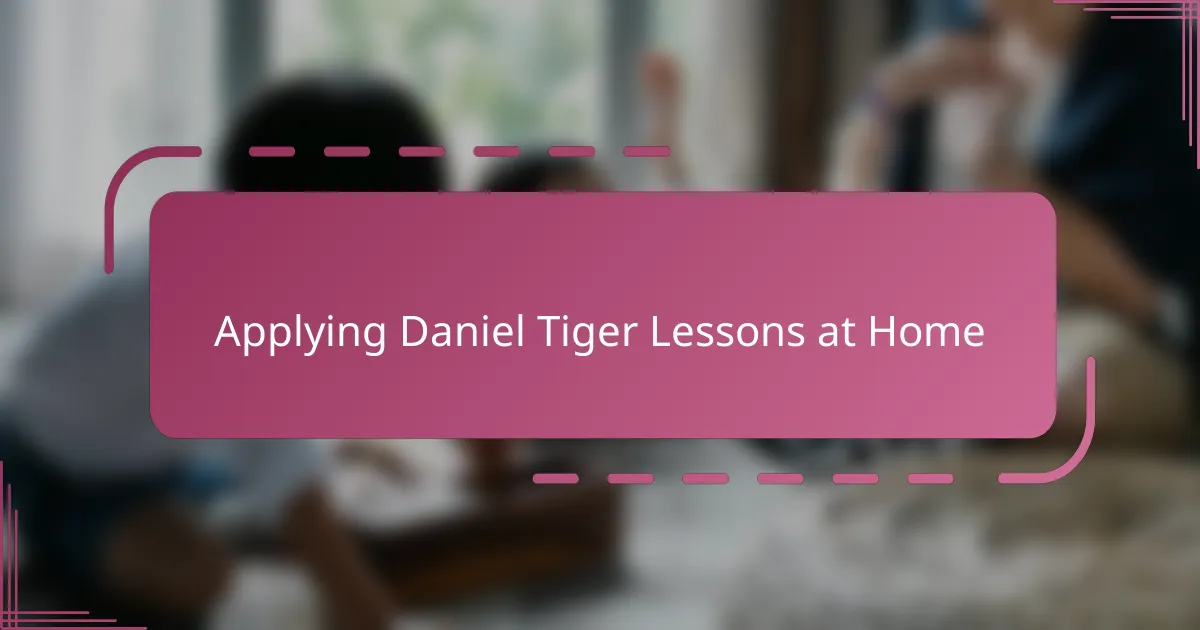
Applying Daniel Tiger Lessons at Home
Bringing Daniel Tiger’s lessons into our daily routine has made emotional learning feel natural rather than forced. For example, when my child gets upset about sharing, I gently remind them of Daniel’s song about taking turns, and it shifts the moment from conflict to cooperation. Have you noticed how these familiar phrases become like anchors for your child’s behavior, guiding them softly through tough feelings?
I’ve also found that creating little rituals, like a “calm-down corner” inspired by Daniel’s breathing exercises, helps my child manage big emotions more independently. It’s rewarding to see them take a deep breath on their own and say, “I can handle this,” just as Daniel does. Isn’t it amazing how these small actions build confidence and self-regulation over time?
Sometimes, we extend Daniel Tiger’s lessons beyond the immediate moment by reflecting together after playdates or family meals. Talking about what emotions came up and how we handled them turns everyday events into rich learning opportunities. Do you find that these discussions deepen your child’s emotional awareness while also strengthening your connection? From my experience, they truly do.
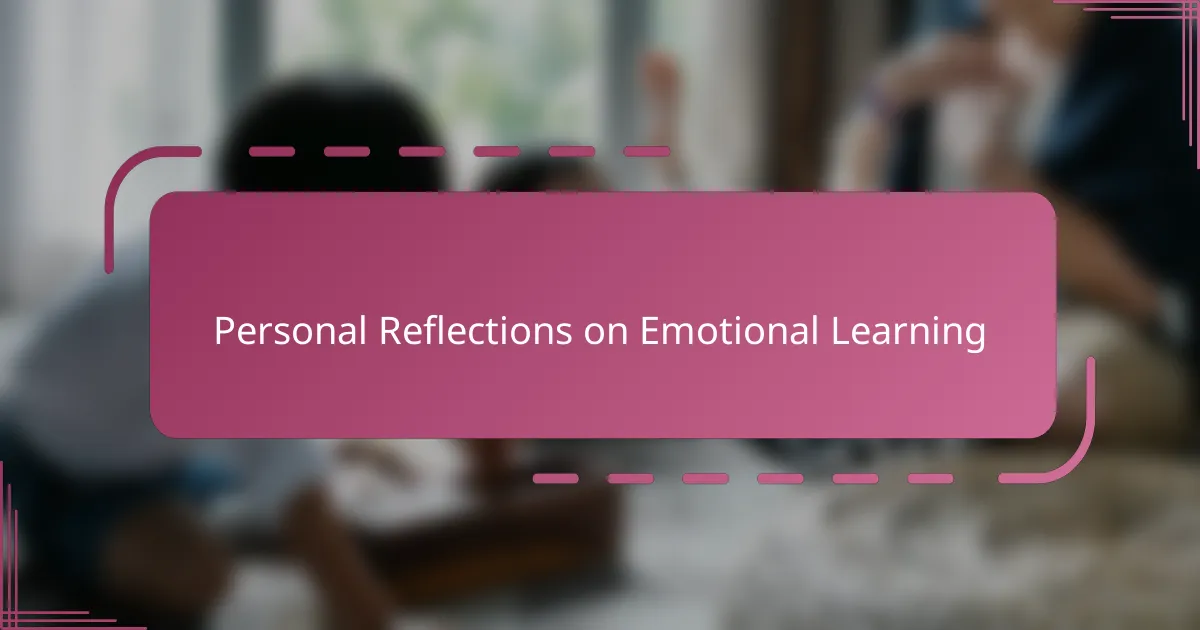
Personal Reflections on Emotional Learning
Thinking back on my own journey with emotional learning, I realize how much Daniel Tiger has shaped the way I understand and address feelings—not just for my child, but for myself too. There were moments when I hesitated to name what I was feeling, but seeing Daniel gently work through emotions gave me permission to be honest. Have you ever noticed how naming an emotion can sometimes make it feel less overwhelming?
One thing I find particularly meaningful is how emotional learning through Daniel Tiger isn’t about suppressing feelings but honoring them. I recall a day when my child was overwhelmed with anger after a disagreement, and instead of rushing to fix it, we paused and talked about what Daniel might do. That simple pause created space for empathy and calm. Isn’t that what we all want—to feel truly seen and understood?
Sometimes, I reflect on how emotional learning is ongoing and imperfect. Even with Daniel Tiger’s lessons, there are days when emotions run high and patience runs low. Yet, these moments become opportunities to model resilience and kindness in the messiness of real life. Have you experienced those messy moments turning into meaningful lessons too? For me, those are the times when growth feels most authentic.
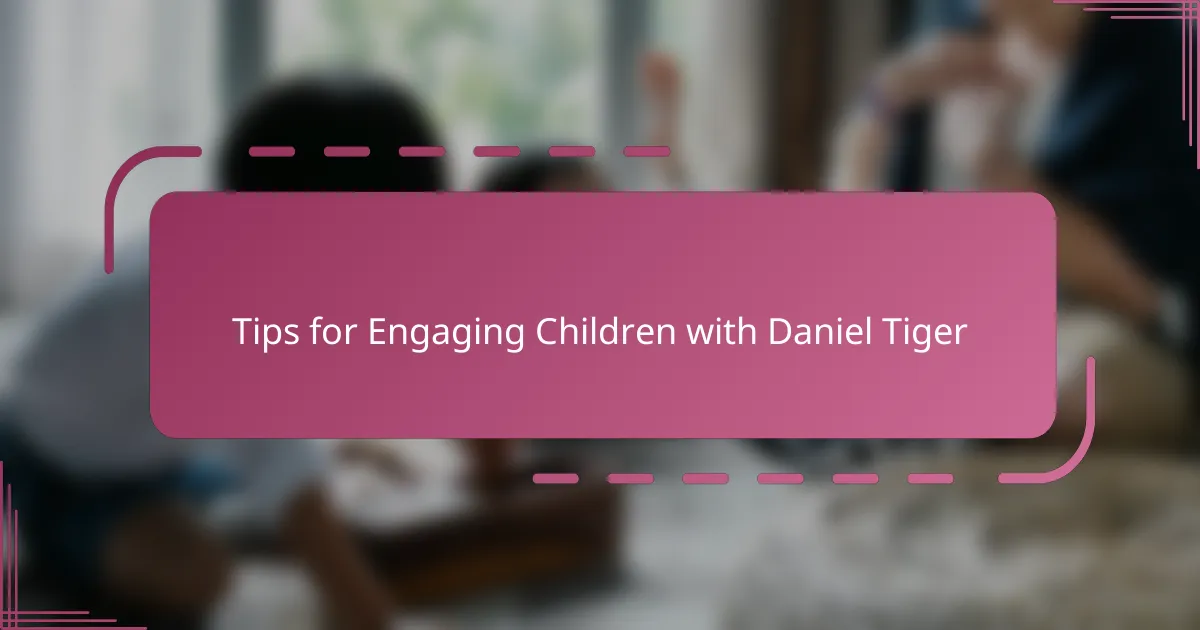
Tips for Engaging Children with Daniel Tiger
One tip I’ve found helpful is to watch episodes with your child rather than letting them watch alone. Sharing the experience opens the door for questions and discussions that deepen understanding—like when my child paused the show to ask why Daniel felt sad, which led us to talk about our own feelings too. Have you noticed how these moments create natural opportunities for emotional coaching?
Another strategy is incorporating Daniel Tiger’s catchy songs into daily routines. When frustration hits, singing along to “Take a Deep Breath” or “When You Feel So Mad” makes calming down feel fun instead of a chore. In my home, these little tunes have become emotional anchors, signaling that it’s okay to pause and reset—don’t you think that’s a powerful way to build emotional resilience?
Lastly, I encourage parents to turn lessons into play. Role-playing situations from the show, like sharing toys or saying sorry, brings abstract concepts into the real world. Watching my child imitate Daniel’s gentle apologies reminds me how play can cement kindness in ways words alone sometimes can’t. Have you tried this kind of playful practice with your little ones? It’s amazing how much empathy grows when it’s lived out loud.
